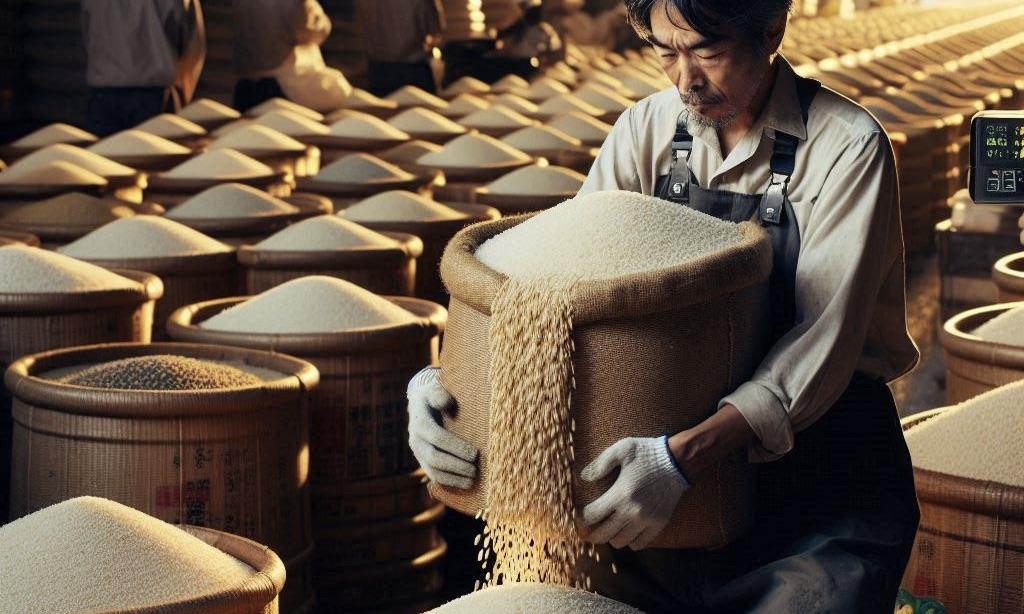Japan's private sector rice inventory fell to a record low of 1.56 million tons in June, the lowest since 1999. The drop, driven by last year's heat and increased tourism, has raised concerns about rising prices amid ongoing high demand.
Japan's Rice Inventory Drops to Record Low Due to Heat and Tourism, Prices Expected to Rise
The farm ministry announced on July 30 (via Japan Today) that Japan's private sector rice inventory decreased to 1.56 million tons in June, the lowest level since comparable data was first recorded in 1999. This represents a 20% decrease from the previous year. The crop was impacted by last year's summer heat and the increased demand for rice fueled by inbound tourism.
There are concerns that the inventory may continue to decrease, resulting in price increases due to the high temperatures that have persisted this summer.
Although the annual demand for rice in Japan had been decreasing due to the country's declining population, preliminary data indicated that the domestic market for the year through June was 7.02 million tons, an increase of 110,000 tons from the previous year. This marks the first increase in ten years.
According to the ministry, one factor that contributed to the increase in demand was the common perception that the rise in rice prices was relatively reasonable compared to those of bread or noodles.
Tourism Boost and Weak Yen Drive Up Japan's Rice Prices to 11-Year High, Yet Market Remains Stable
According to a 2023 report on foreign visitors to Japan by the Japan Tourism Agency, eliminating COVID-19 travel restrictions and a weak yen have increased the number of tourists visiting Japan, with the consumption of Japanese cuisine being a top priority.
In June, the average price of rice produced in 2023 reached 15,865 yen per 60 kilograms when producer cooperatives sold it to wholesalers, the highest level in approximately 11 years.
Despite the challenges, the ministry reassures that the supply-demand balance is not in a crisis. The distribution of rice produced in 2024 is still underway, indicating the market's resilience.
The government's projection for the future is optimistic. It anticipates a decrease in domestic demand to 6.73 million tons during the same month and a decrease in rice inventory to 1.52 million tons by June of the following year, paving the way for potential growth in the market.



 Gold Prices Rebound as U.S. Tariffs, Fed Policy and Iran Talks Drive Market Sentiment
Gold Prices Rebound as U.S. Tariffs, Fed Policy and Iran Talks Drive Market Sentiment  Tokyo Core Inflation Slows Below 2%, Complicating BOJ Rate Hike Outlook
Tokyo Core Inflation Slows Below 2%, Complicating BOJ Rate Hike Outlook  USITC to Review Impact of Revoking China’s PNTR Status, Potentially Raising Tariffs on Chinese Imports
USITC to Review Impact of Revoking China’s PNTR Status, Potentially Raising Tariffs on Chinese Imports  U.S. Stock Futures Fall as Nvidia Drops Despite Strong Earnings; Netflix Jumps 9%
U.S. Stock Futures Fall as Nvidia Drops Despite Strong Earnings; Netflix Jumps 9%  U.S.-Canada Trade Talks Resume as Trump Administration Reviews USMCA
U.S.-Canada Trade Talks Resume as Trump Administration Reviews USMCA  PBOC Scraps FX Risk Reserves to Curb Rapid Yuan Appreciation
PBOC Scraps FX Risk Reserves to Curb Rapid Yuan Appreciation  Strait of Hormuz Oil and LNG Shipments Disrupted After U.S.-Israel Strikes on Iran
Strait of Hormuz Oil and LNG Shipments Disrupted After U.S.-Israel Strikes on Iran  Venezuela Oil Exports to Reach $2 Billion Under U.S.-Led Supply Agreement
Venezuela Oil Exports to Reach $2 Billion Under U.S.-Led Supply Agreement  IMF Urges U.S. to Cut Fiscal Deficit to Reduce Trade and Current Account Gaps
IMF Urges U.S. to Cut Fiscal Deficit to Reduce Trade and Current Account Gaps  Australian Dollar Rallies on Hawkish RBA Outlook; Yen Slips as BOJ Faces Political Pressure
Australian Dollar Rallies on Hawkish RBA Outlook; Yen Slips as BOJ Faces Political Pressure  Bank of Korea Holds Interest Rate at 2.50% as Growth Outlook Improves Amid AI Chip Boom
Bank of Korea Holds Interest Rate at 2.50% as Growth Outlook Improves Amid AI Chip Boom  Dominican Republic Unveils Massive Rare Earth Deposits to Boost High-Tech and Energy Sectors
Dominican Republic Unveils Massive Rare Earth Deposits to Boost High-Tech and Energy Sectors  MOEX Russia Index Hits 3-Month High as Energy Stocks Lead Gains
MOEX Russia Index Hits 3-Month High as Energy Stocks Lead Gains  Asian Stocks Rise on Nvidia Earnings Boost; Yen Weakens as BOJ Rate Outlook Clouds
Asian Stocks Rise on Nvidia Earnings Boost; Yen Weakens as BOJ Rate Outlook Clouds  BOJ Signals Possible April Rate Hike as Ueda Eyes Inflation and Wage Growth Data
BOJ Signals Possible April Rate Hike as Ueda Eyes Inflation and Wage Growth Data  Stock Market Movers: Dell, Block, Duolingo, Zscaler, CoreWeave, Autodesk, Rocket, MARA
Stock Market Movers: Dell, Block, Duolingo, Zscaler, CoreWeave, Autodesk, Rocket, MARA 































